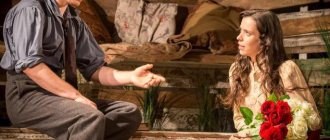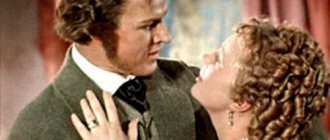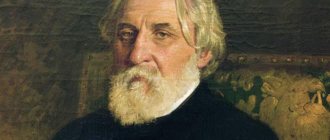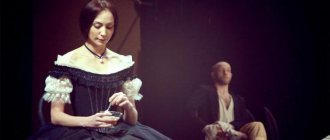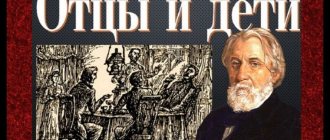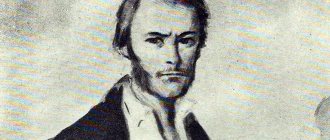Arkady: “A nihilist is a person who does not bow to any authority, who does not accept a single principle on faith, no matter how respectful this principle may be.”
***
Bazarov: “We act because of what we recognize as useful. In this day and age, the most useful thing is denial. We deny."
***
Bazarov: “Human moral illnesses come from the bad state of society. Correct society and there will be no diseases.”
***
“All people are the same, like trees in a forest. No botanist will study every single birch tree.”
***
“If you like a woman, try to make sense of her. It didn’t work out, well, move away - it’s not the light that has come together like a wedge.”
The image of Evgeny Bazarov in the novel “Fathers and Sons”: a description of the personality
Evgeny Bazarov is the main character of the famous novel “Fathers and Sons” by Turgenev.
***
". – Are you actually studying physics? – Pavel Petrovich asked in turn.
***
". I, the future doctor, and the doctor’s son, and the sexton’s grandson. After all, you know that I am the sexton’s grandson. Like Speransky. "
***
Evgeny himself does not consider himself a nobleman, although on his mother’s side he is a real nobleman:
***
“Your brother, a nobleman, cannot go further than noble humility or noble boiling, and this is nothing.” (Bazarov to Arkady)
***
- ". but people like him shouldn’t be measured by an ordinary yardstick, right. "
***
". The servants also became attached to him, although he made fun of them: they felt that he was still their brother, not a master. "
***
". Bazarov, who knew how to talk to men, did not even suspect that in their eyes he was still something of a fool. "
***
". “We act because of what we recognize as useful,” said Bazarov. – At the present time, the most useful thing is denial – we deny. "
***
- ". teasing as usual, he entered into a conversation with some man. "
***
". in my opinion, it is better to break stones on the pavement than to allow a woman to take possession of even the tip of a finger. "
***
". Are there any pretty women here? - asked Bazarov, finishing his third glass. "
***
". “Yes,” answered Bazarov, “a woman with a brain.” Well, she's seen the sights. "". After all, you despise us all. "(Odintsova to Bazarov about women)
***
Maria, disputes about Bazarov’s nobility have been going on for a long time. The novel does not contain precise information about Bazarov's nobility.
***
In various sources, Bazarov is called both a nobleman and a commoner. To support our version, we provide several quotes.
SPADILO.RU
Still from the film “Fathers and Sons”. Bazarov - actor V. Avdyushko
The hero of the novel “Fathers and Sons” Evgeny Bazarov was conceived by I.S. Turgenev as a collective image of a democrat commoner - a new representative of the youth of the late fifties of the 19th century. Bazarov’s strong, active personality reflected the character traits of several people at once. According to the author himself, he based the portrait of his character on a certain “Doctor D.”, a doctor from the provinces, whom he met on one of his trips by rail.
Description of the hero
Bazarov is a thirty-year-old educated young man, a commoner, the son of a former regimental doctor, like his father, who chose medicine as his profession. He is not only a future doctor, but also a budding natural scientist. The author describes his hero as a tall and attractive man: “tall, in a long robe with tassels,” “glorious face,” “long and thin, with a wide forehead, a flat top, pointed nose down, large greenish eyes and hanging sideburns of a sandy color,” the face “enlivened with a calm smile and expressed self-confidence and intelligence,” “long fingers.”
Bazarov comes from a simple family, the head of which serves as the district doctor. Evgenia's mother belongs to an impoverished noble family. Her entire inheritance is a small estate and fifteen peasant souls. The father ironically calls himself a “plebeian”; he works, despite his advanced age, to feed his family and give his son a decent education.
Despite his semi-noble origins, Bazarov does not consider himself to be part of this class; he feels “the absence of everything noble, everything higher that both attracts and frightens.” The hero himself says about himself: “The graceful side of life is inaccessible to me.” Hence the ease with which Evgeniy gets along with ordinary people, while he proudly says: “My grandfather plowed the land!” and calls himself, in a peasant manner, Evgeniy Vasiliev. He deliberately emphasizes his indifference to noble origin. Moreover, representatives of the aristocracy and nobility do not evoke the slightest respect in him, as evidenced by his peculiar manners. He offers his hand to Nikolai Petrovich, after a pause, and in a conversation with him, without an invitation, he sits on the sofa, “stretching.” He deliberately demonstrates his tactlessness, bad manners, and rude manners.
According to Bazarov, the only value of a person is his skills and work that benefits others. It is constant work that forms the basis of the life of the hero himself: “Bazarov brought a microscope with him and spent hours fiddling with it,” “his main subject was natural sciences,” “he set to work on his frogs, ciliates, chemical compounds and kept fiddling with them."
In his speech, Bazarov often uses sayings and proverbs: “He got burned on his own milk, he blows on someone else’s water,” “The Russian peasant will eat God.” All these expressions once again emphasize the hero’s democracy and his closeness to the common people. Despite his charismatic nature, thoroughly imbued with nihilistic and European ideas, Bazarov is the embodiment of many traits of the Russian national character. This is manifested in the manner of dealing with the common people, in “a special ability to arouse trust in lower people.” In this sense, the hero is more Russian than all the other characters in the novel. “His speech is distinguished by simplicity, accuracy, mockery and a completely Russian style.”
Bazarov is not a fan of long monologues; his speech is more like short remarks. But they are all filled with deep meaning, which once again confirms his reading, education and wit. Many of his expressions turned into catchphrases: “A decent chemist is twenty times more useful than any poet,” “You study the anatomy of the eye: where does this mysterious look come from?”, “Nature is not a temple, but a workshop, and man is a worker in it.” , “People are like trees in a forest, not a single botanist will study each individual birch tree.”
Bazarov is as indifferent to his appearance as he is to the conditions accepted in noble circles. He constantly wears the same well-worn suit and also behaves freely and uninhibitedly in any society. He has “casual manners,” “unsyllabic and fragmentary speech,” “lack of coquetry,” “harshness of judgment,” and “complete swagger.” He does not try to be good in the eyes of his interlocutor and says everything he thinks: “shortly and reluctantly,” “occasionally inserted a mocking word into the conversation,” thereby emphasizing his superiority over the aristocrats.
Bazarov is a proud man: “I’m a poor man, but I still haven’t accepted alms.” The author's characteristics indicate that Bazarov is an arrogant person: “he stood up arrogantly,” “he answered with arrogant pride.” Evgeniy calls himself: “...after all, I am a giant.” Most often, the main character is indifferent to those around him: “Bazarov, too, remained cold as ice.”
The nihilist Bazarov has his own life philosophy: “at the present time, it is most useful to deny.” Thus, he does not accept anything: neither the political system, nor religion, nor art: “Raphael is not worth a penny,” “a decent chemist is twenty times more useful than any poet”; nor love: “it’s all romanticism, nonsense, rottenness”; nor the family in its old patriarchal understanding: “Have you heard about daughters-in-law?” But Bazarov is also in no hurry to create anything new: “first we need to clear the place.” The nihilism that he preaches, denying all values and authorities, turns him into a destroyer of his own life. The symbol of this destruction is his premature death, which he also brought about with his own hands, accidentally cutting himself during the autopsy.
The role of the hero in the work
When creating the image of Bazarov I.S. Turgenev's goal was to paint a portrait of a new rebel man and to understand what the emergence of such a phenomenon as nihilism threatens society with. Representatives of this trend were young people, who in the novel can be called “children,” their protest was directed against the old noble guard of the “fathers.”
Bazarov is the main character of the novel, which runs through 26 chapters of the work out of 28. All other characters are concentrated around the hero’s personality; through interaction with them, his appearance, his strong, extraordinary character are revealed. At the same time, Turgenev contrasts Bazarov with other heroes, constantly pitting him against them in different situations and dialogues.
Bazarov is the bearer of advanced ideas of his time, the main of which was nihilism, which was already widespread in certain circles at the time the novel was written. Turgenev achieved his goal - he created a completely new hero, who had never before been seen in fiction. The author does not provoke the reader and does not give his assessment of the hero. His attitude towards him is calm and respectful. He gradually, step by step shows the weaknesses of nihilism.
The image created by Turgenev represents an intelligent, active, thinking person. But his hero turned out to be completely soulless, and a person without a soul is just a shell, under which lies only emptiness.
Character development as the story progresses
Turgenev leads Bazarov through the circles of life's trials. At first, Bazarov is confident in his abilities, in the cause he serves. He is a proud, purposeful person, a bold experimenter and a denier. Under the influence of various reasons, his views undergo significant changes. Turgenev confronts his hero with serious life trials, as a result of which Bazarov has to give up a number of beliefs. It displays traits of skepticism and pessimism. One of these tests is the hero’s love for Anna Sergeevna Odintsova. The commoner Bazarov feels awkward in front of the aristocrat Odintsova; he gradually discovers in himself a feeling the existence of which he previously denied.
Its dependence on the ordinary laws of human life, its involvement in simple human interests, concerns and suffering are revealed. Bazarov's initial self-confidence disappears, his inner life becomes more and more complex and contradictory.
Turgenev's hero suffers defeat in love. Ultimately, he is left alone, his spirit is almost broken, but even then Bazarov does not want to open himself to simple, natural feelings. He is cruel and demanding of his parents, as well as of everyone around him. Strong and strong-willed, convinced that he is right, Bazarov, however, loses in the most important thing. It is not the Kirsanov brothers who punish him, but life itself. He fails in friendship and love, that is, in those human relationships on which the world “rests.” It is solely through Bazarov’s fault that his friendship with Arkady, a devoted and faithful comrade, is interrupted. His beloved woman Odintsova is afraid of his passionate, rude and uncontrollable nature. “She forced herself to reach a certain line, forced herself to look beyond it - and behind it she saw not even an abyss, but emptiness... or ugliness.” This is seen as the tragic guilt of the hero, the reason for his inevitable death.
The outcome of Bazarov's life is tragic. He dies young, full of strength and alone. Even a nihilist cannot refute the law of death: “Try to deny death. She denies you, and that’s it!” Before death, the true essence of Bazarov's personality is revealed. It’s as if he is throwing off the mask of a nihilist and cynic that he no longer needs, and suddenly it turns out that he is devoted and tender to his parents, suffers from unrequited love and loneliness, and regrets a life lived in vain. Only in the face of death does Bazarov begin to vaguely understand the value of such manifestations of life as poetry, love, beauty.
The novel ends with the author's sad reflections over Bazarov's grave. His passionate, rebellious heart is forever hidden underground in a small cemetery, but the beautiful nature around reminds him of eternal life, and the tears of old people at his son’s grave remind him of immortal love.
The author's attitude towards the hero
The author's attitude towards Bazarov cannot be called unambiguous. It changes as the plot develops and undergoes great changes from complete rejection to sympathy. When Turgenev conceived his hero, his attitude towards him was extremely negative, because he categorically denied such a phenomenon as nihilism, of which Bazarov was a representative. As the image of Eugene is revealed, the author gradually softens, and notes of still weakly expressed sympathy appear. But this, again, concerns only the hero’s personality – strong, courageous and honest. As for his views, the author’s position here remains unchanged. For all his sympathy for Bazarov, he still fails to make nihilism attractive. The basis of Bazarov’s worldview is the destruction of everything that is so dear to the Kirsanov brothers: family ties, moral principles, traditions, the old, familiar way of life. In return, practically nothing is offered. To Pavel Petrovich’s remark that it is necessary to build, Bazarov replies: “This is no longer our business. First we need to clear the place."
I.S. Turgenev said this about his hero: “I dreamed of a gloomy, wild, large figure, half grown out of the soil, strong, evil, honest - and yet doomed to destruction.” P.A. Kropotkin in “Notes of a Revolutionary” describes Turgenev’s attitude towards his hero as follows: “... when we were returning in the carriage, he asked me what my opinion was about Bazarov. I answered frankly: “Bazarov is a magnificent type of nihilist, but you feel that you don’t love him as much as you loved other heroes,” “On the contrary, I loved him, I loved him very much,” Turgenev exclaimed with unexpected fervor, “We’ll come.” home, I’ll show you the diary where I wrote down how I cried when I finished the story with Bazarov’s death,” but I think Turgenev admired Bazarov more than loved him.”
Prototypes
The author of “Fathers and Sons” himself calls the prototype of Bazarov a certain Doctor D., a young doctor from the provinces, who seemed to Turgenev to be a man of a new type. However, creativity researcher I.S. Turgeneva N. Chernov refutes this common hypothesis. In his opinion, the prototype of Bazarov was Turgenev’s neighbor on the estate, doctor V.I. Yakushkin. In addition to his medical activities, he was engaged in scientific research and was a member of illegal organizations.
Some researchers agree that “Dr. D” and V.I. Yakushkin is one and the same person. In addition, the traits and views of V.G. can be traced in Bazarov’s character. Belinsky and N.A. Dobrolyubova. Many believe that Bazarov is a direct reflection of Belinsky: both were the sons of military men, and then of zemstvo doctors, but what they have in common, in addition to this, is that they were both rabid supporters of “new ideas.”
Film adaptations of the hero
There are several film adaptations of the famous novel by Ivan Sergeevich Turgenev. The first film “Fathers and Sons” from the Lenfilm studio was released in 1958. The directors of the film were Adolf Bergunker and Natalya Rashevskaya. According to viewers and film critics, this version is the best adaptation of the novel. The role of Bazarov in the film was played by the famous Soviet actor Viktor Antonovich Avdyushko (1925-1975). He was an unusually charming man, endowed with a somewhat stern appearance, largely because of which he was invited by the directors to play this role.
The image of Bazarov created by V. Avdyushko is so bright and convincing that it does not leave any of the spectators indifferent. In the performance of this actor, Bazarov appears as a self-confident, intelligent, sensible man. The actor managed to convey many emotions with just one look - his eyes are a reflection of the hero’s soul. Large hands emphasize hard work, and a straight figure - inflexibility of character. The actor managed to convey through a mask of coldness all the spiritual qualities of his film character.
Literature
- Zagorskaya E. Ya., Taktashova T. V., Vetoshkina L. A. Declaration of love. Fragments of works of Russian writers of the 19th–20th centuries. with comments and assignments. Tutorial. M., Flinta, 2012.
- I. S. Turgenev in the memoirs of his contemporaries. Volume 1. M., “Fiction”, 1983. Compiled by: S. M. Petrov, V. G. Fridlyand
- Stakhorsky S.V. (composition and ed.) Encyclopedia of literary heroes M.: Agraf, 1997.
- All Heroes of works of Russian literature. Compiled by: Arkhangelsky A.N., Pak D.P., Shklovsky E.A. Publisher: AST, Olympus, 1997.
- Alekseev M.P., Izmailov N.V., Nazarova L.N. Turgenev collection: Materials for the complete works and letters of I.S. Turgenev. Volume IV. L., Nauka, 1968
- Nikolsky S.A. Russian worldview. “New people” as an idea and a phenomenon: the experience of comprehension in Russian philosophy and classical literature of the 40-60s of the 19th century Publisher: Progress-Tradition. M., 2012.
- A.B. Yesin. Principles and techniques of analyzing a literary work. Uch. A manual for students and teachers of philological faculties. M., Flinta, 2000.
- I.S. Turgenev and time. Digest of articles. Author V.S. Kiselev. TSU Publishing House, 2021.
- Magazine "New World". 1968. No. 10
Quotes Evgeny Bazarov
- A real person is not one about whom there is nothing to think, but who must be obeyed or hated.
***
When I meet a person who would not give up in front of me, then I will change my opinion about myself.
***
There was an empty space in the suitcase, and I put hay in it; It’s the same in our life’s suitcase: no matter what they fill it with, as long as there is no emptiness.
***
There is no need for you to get excited, because I don’t care at all. A romantic would say: I feel that our paths are starting to diverge, but I’m just saying that we’re tired of each other.
***
“I look at the sky only when I want to sneeze,” Bazarov grumbled and, turning to Arkady, added in a low voice: “It’s a pity that I interrupted.”
***
- A person is able to understand everything, how the ether trembles and what happens in the sun; but how a person can blow his nose differently than himself, he is not able to understand.
Bazarov's character
Positive character traits of Bazarov include hard work and interest in science (he adopted these qualities from his father). He despises the parasitic way of life, phrase-mongering, and respects the peasants. This hero is used to working and earning an honest living: he sharply condemns idle pastime, does not like balls and social evenings, and never dances.
Negative character traits of the hero include his excessive uncompromisingness, cynicism, and disdain for love, poetry, art and philosophy.
The inconsistency of Bazarov’s character lies in the fact that this hero is both a creator (he is active, hardworking, engaged in science) and a destroyer (he denies authorities and everything beautiful that is in life).
“Fathers and Sons” - quotes for essays
". This doctor’s son was not only not timid, he even answered abruptly and reluctantly, and there was something rude, almost impudent in the sound of his voice. "
***
". Everyone in the house got used to him, to his careless manners, to his unsyllabic and fragmentary speeches. "
***
". It was only then that the whole bottomless abyss of Bazarov’s pride was revealed to him for a moment. "
***
“Since I’ve been here, I’ve been feeling really bad, as if I’ve read Gogol’s letters to the Kaluga governor.”
***
- “It is better to break stones on the pavement than to allow a woman to take even the tip of a finger.”
***
“You have no reason to get excited, I don’t care at all. A romantic would say: I feel that our paths are starting to diverge, but I’m just saying that we’re tired of each other.”
***
“Like all women who failed to fall in love, she wanted something, without knowing what exactly. Actually, she didn’t want anything, although it seemed to her that she wanted everything.”
***
“In still waters. You know! You say she's cold. This is where the taste lies. You love ice cream, don't you?
***
". Bazarov's eyes sparkled for a moment from under his dark eyebrows. "
". He slowly ran his long fingers over his sideburns. "
Attitude to life, society, people
Bazarov is an active person. He despises people leading an idle lifestyle.
The priority for him is benefit, not beauty. He believes that the time of romanticism has passed, the age of people who do real useful things, and do not have their head in the clouds, has come. In his eyes, romantics, especially older ones, are ridiculous. In his opinion, the fact that Nikolai Petrovich plays the cello and reads Pushkin is “no good.” He advises Arkady to give his father something useful to read, for example, the book of the materialist philosopher Buchner “Matter and Force”.
Bazarov does not recognize authorities and old truths. He believes that it is no longer possible to repair the old building of life, that it is necessary to first “clear the place” and then build a new life.
Evgeny himself does not spend time idly, he is active, does not tolerate walks without a purpose, and if he walks, it is only to collect insects and herbs for study. In his opinion, nature is a workshop, not a temple, “and man is a worker in it.”
To Pavel Petrovich , discussing the importance of the self-esteem of aristocrats, Bazarov says that aristocrats respect themselves, but this has no benefit for the public good.
Arkady , like his father, Nikolai Petrovich , to be a timid person with a gentle soul, a liberal “barich”, capable only of speaking beautifully.
Odintsova an intelligent woman with self-esteem. But he didn’t like her excessive love for comfort, order, and regularity of daily life. Although in conversations with Odintsova he showed contempt for romantics, he understood that he himself treated her as a romantic, and this aroused indignation in him.
Odintsova’s sister Katya to be a smart girl who would stand up for herself and “take Arkady into her hands.”
treated Sitnikov and Kukshina with disdain, feeling that their passion for nihilism was superficial.
Evgeniy loved his parents When Arkady told his friend that his mother was an intelligent woman, he was surprised, since he himself did not know what to talk to her about.
Aphorisms about nihilism
- “As for time, why will I depend on it? It’s better to let it depend on me.”
***
“When I meet a person who would not give up in front of me, then I will change my opinion about myself.”
***
“There was an empty space in the suitcase, and I put hay in it; It’s the same in our life’s suitcase: no matter what they fill it with, as long as there is no emptiness.”
***
“A person is able to understand everything, how the ether trembles and what happens in the sun; but how a person can blow his nose differently than himself, he is not able to understand this.”
***
“A real person is not one about whom there is nothing to think, but whom one must obey or hate.”
***
". Our man is happy to rob himself just to get drunk on dope in a tavern. "
***
“Every person hangs by a thread, an abyss can unfold beneath him every minute, and yet he invents all sorts of troubles for himself, ruining his life.”
Origin, upbringing, education
Bazarov was the grandson of a sexton, the son of a retired army surgeon and a poor noblewoman. His parents are religious people who love their son very much. Unlike them, Eugene renounced his faith, and this greatly upset them, especially his mother.
He was convinced that a person should educate himself. And Evgeniy really raised himself, taking from his parents only what he considered useful (for example, like his father, he was hardworking and active).
The parents tried to give their son a good education. He studied at the university, studied natural sciences, and wanted to take the doctor's exam next year.
Bazarov's quotes about nature
“Flying fish can stay in the air for a while, but soon they must splash into the water.”
“A maple leaf, when it falls to the ground, looks like a butterfly, and this is strange because the driest and deadest is similar to the most cheerful and lively.”
***
“There must be something special, some kind of vanity, in the feeling of a person who knows and says that he is poor.”
***
. And he looked around, as if wanting to understand how one could not sympathize with nature. "
***
“Personality, dear sir, is the main thing; The human personality must be as strong as a rock, for everything is built on it.”
***
“They [the Russian people] sacredly honor traditions, they are patriarchal, they cannot live without faith.”
***
“Without self-esteem, without self-respect - and in an aristocrat these feelings are developed - there is no solid foundation. public building. "
Nihilistic views of the hero
Evgeny Bazarov appears before readers as a very proud and extremely self-confident person. For him there are no authorities; he is completely confident in his superiority over other characters in the novel and, first of all, over Pavel Petrovich Kirsanov.
The main character of the novel denies all generally accepted norms and values: he does not recognize art, is indifferent to love, to the beauty of nature. In his opinion, the world around us is only a means for a person to achieve certain goals, a special workshop for scientists. He himself constantly conducts various experiments and tests.
Bazarov also condemns any manifestations of feelings: friendship for him is nothing more than friendship, and love is nothing more than a physiological attraction. The hero is sure that the time of romanticism has sunk into oblivion and the time of efficient people has come. He believes that a person should do useful things and not have his head in the clouds. The priority for him was not beauty, but benefit. Evgeniy wants to be useful to society: therefore, he connects his life with science, namely medicine.
From the history of the creation of the novel
The author in the article “About “Fathers and Sons”” wrote that the image of Bazarov arose in him after meeting a young provincial doctor, in whom he saw the emerging ideology of nihilism. Although for the liberal nobleman Turgenev not everything was clear in the young man’s worldview, his personality made a strong impression on the writer. He began to delve into the essence of the theory of nihilism and even began to write a diary on behalf of his future hero in order to understand it. The ideology of nihilism, according to Turgenev, was just being established. Therefore, the new type of person that appeared during the social crisis was not yet fully formed, and most importantly, it was not entirely clear to the writer himself. The author does not share Bazarov's nihilistic beliefs and even debunks them during the course of the novel. Turgenev’s confession about his attitude to the image of Bazarov, which he expressed in a letter to A. Fet, is interesting: “Did I want to curse Bazarov or glorify him? I don’t know this myself, because I don’t know whether I love him or hate him.”
Test of love
To show how wrong Bazarov was in his absolute denial of everything beautiful, the author puts him through a test of feelings. Having met Anna Sergeevna Odintsova, Evgeny realizes that in front of him is a unique woman, a perfect example. Over time, love for her flares up in his soul, but Odintsova is frightened by Bazarov’s passion. Anna Sergeevna gives him a stern rebuke. It affects him like a blow from a whip. Realizing that love is still a strong feeling, and even he is susceptible to it, he suffers internally and goes home to his parents.
Origin of Evgeniy Vasilievich
Turgenev brings to the fore a hero of non-noble origin. Bazarov comes from a poor peasant family, the son of a district doctor. He speaks triumphantly about his origins: his grandfather was a peasant and plowed the land.
He deliberately keeps silent about the biography of his maternal grandfather, thereby emphasizing the lack of admiration for the noble class.
In his life, Bazarov achieved everything through hard work ; he never asked for a loan from his family.
First meeting
The reader first meets Bazarov at the post station, he arrives together with his comrade and follower, Arkady Kirsanov. His appearance immediately attracts increased attention:
“Long and thin (face), with a wide forehead, a flat upward, pointed downward nose, large greenish eyes and drooping sand-colored sideburns, it was enlivened by a calm smile and expressed self-confidence and intelligence.”
Bazarov's manner of communication with the people around him is slightly cheeky. Without pretending to luxury, he agrees to give up his comfort and sets off after the Kirsanovs on a tarantass.
Bazarov and parents
Evgeny Bazarov's relationship with his parents is very cool. He loves his old people, but their lifestyle makes him mortally sad. He always strives to leave his home somewhere. His mother is a little afraid of him and tries not to bother him with her questions. The father is immensely proud of his son, claiming that there is no other person like him on earth:
“And I, Arkady Nikolaich, not only adore him, I’m proud of him...”
Bazarov's death at the end of the novel is the natural conclusion of his story. Having appeared before his time, he remained alone. Bazarov had no true friends, only temporary companions who were unable to solve the riddle of his soul.
Do you know the answer?
Items
New questions
Site rating
- 1. Daniil Vasiliev 450
- 2. Alexander S 445
- 3. Daria Zavgorodnyaya 225
- 4. Igor Proskurenko 145
- 5. Isabella Bevz 136
- 6. Herodotus Abazbek 127
- 7. Vladimir Kuntin 106
- 8. Anton Kovalevich 98
- 9. Nastya Nikitina 95
- 10. Niya B 94
- 1. Kristina Volosocheva 19.120
- 2. Ekaterina 18,721
- 3. Yulia Bronnikova 18,580
- 4. Darth Vader 17,856
- 5. Alina Saibel 16,787
- 6. Igor Proskurenko 15,876
- 7. Maria Nikolaevna 15,775
- 8. Larisa Samodurova 15,735
- 9. Liza 15,165
- 10. TorkMen 14,876
The most active participants of the week:
- 1. Victoria Neumann - bookstore gift card for 500 rubles.
- 2. Bulat Sadykov - bookstore gift card for 500 rubles.
- 3. Daria Volkova - bookstore gift card for 500 rubles.
Three lucky people who passed at least 1 test:
- 1. Natalya Starostina - bookstore gift card for 500 rubles.
- 2. Nikolay Z - bookstore gift card for 500 rubles.
- 3. David Melnikov - bookstore gift card for 500 rubles.
The cards are electronic (code), they will be sent in the coming days via VKontakte message or email.
Source
